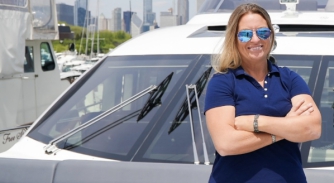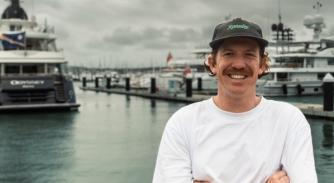Navigating the crew recruitment dilemma
Phil Richards, technical recruitment consultant and Y1 marine engineer, advocates quality over quantity to improve the crew recruitment process…

Phil Richards, technical recruitment consultant, Lighthouse Careers
While recruiters in the industry often harp on about the importance of longevity, one thing is for certain: no matter how much longevity someone has on board, at some point, sure as the sun will set in the West, it will have to end.
Perhaps a deckhand leaves because he fell in love with a local lass on the Pacific island you anchored off or the second engineer went for a beer in Barcelona on a Friday night and didn’t come back for two weeks. Maybe the vessel is sold or maybe it’s just time for a captain or chief stewardess to move ashore after a long and stellar career in the industry. Whatever the reason, our time on a boat will end. It’s just the way things are.
So replacing crew is inevitable – it will happen at some point. What senior officers and management often do at this point is sensibly enlist recruiters to help them find a replacement. However, they will often enlist the services of five, six, seven or even more agencies to help them in their search.
While I can understand there can be perceived valid reasons for doing this, such as casting a net as far as possible to see if one of the agents or companies is able to uncover a diamond in the rough, or fear of missing out on that potentially perfect candidate, there are a number of downsides that those in the position of hiring manager are often not aware of, some of which have a damaging effect on our industry.
One of the main downsides is that of promoting excessive competition amongst recruiters, all of whom are fishing from the same pool for candidates. This excessive competition often leads to poor practices amongst recruiters, some of which I have witnessed directly in my short time as a recruiter, such as the sending of CVs to vessels without even speaking to or asking permission of the candidates in an effort to get a particular candidate who fits the bill ‘first past the post’ and thereby claim a recruitment fee for doing so.
While I believe competition is overall good, ensuring that quality recruitment agencies and recruiters don’t rest on their laurels and endeavour to be the best they can be, there are also downsides. Recruiters are often reluctant to spend a lot of time running certain roles past candidates and getting to know them, particularly in the more junior roles, as there are others out there who will perform these unscrupulous and unprofessional acts such as sending CVs over without the candidates’ permission to be first on the client’s desk ‘just in case’ they fit the bill.
This rush to get candidates through the door only results in poor-quality recruiting, with recruiters cutting corners, which is often unfulfilling for recruiters and does not lead to the best results for clients. It should be a recruiter’s job to ensure the client is being provided with the right candidates and the right information to make an informed decision about who they will hire, who will fit in with the team on board long term, and for this to be done properly it takes a little time.
Build up a solid, functional working relationship with a recruiter you trust
to do the job of recruiting for you.
However, there is nothing more demoralising than spending three or four hours interviewing someone, writing up their notes, checking their references, checking their certificates and sending it over to the vessel all packaged up neatly, only to find out that the candidate has already been received through another agency who hasn’t put in the time or effort to do the same.
This also leads to recruiters often having a poor reputation among clients due to taking shortcuts like these, while it’s the clients’ practice of tendering the roles to multiple agencies that is unwittingly perpetuating the problem, and so round and round we go. While it’s very clear that the vessels certainly cannot be blamed directly for these poor practices, they do inadvertently contribute by creating the conditions for such.
I would have said that 10 or more years ago, you could have argued a case that some recruiters had access to a larger pool of candidates, or some candidates would sign up with just a few agencies, so enlisting the services of several agencies might have made sense. But these days, with changes in the way candidates apply for jobs, often using websites such as Yotspot where it’s normal to see the same job advertised by different agencies, one can appreciate that candidate pooling has become more centralised.
So what can be done to improve this sticky dilemma?
I think one way would be to build up a solid, functional working relationship with a recruiter you trust to do the job of recruiting for you. As we all know, this industry is built on relationships. In many ways, crew agents are the gatekeepers and, rightly or wrongly, play a vital part in shaping the industry.
Look for someone who knows the industry and who has done the job before. Why would you ask an accountant to recommend you a good builder? It’s the same with recruiting. Why would you ask someone who has never worked as an engineer to identify a good engineer? Likewise with the interior, deck or galley departments.
Look for recruiters who go in depth and provide you with a detailed, accurate description of their candidates, and who provide reference checks. This shows that they have spoken to, researched and understood their candidates enough to honestly represent them in the best way possible.
By cultivating this relationship, you can get to know a recruiter and a recruiter can get to know you: how you work, what kind of people you get along with, the culture you bring to a vessel. You can work together with your recruiter to find out what you need to know from candidates. After all, why pay recruiters thousands in fees if you are going to do most of the work yourself?
You can allow your recruiter time to do their job properly and thoroughly, and not rush to get candidates over to you before someone else does. This, I believe, can only benefit the client, the candidate and the industry as a whole.
The role of AI in the recruitment process is explored in the next issue of The Superyacht Report – Captains focus, due out later this month. To gain access to The Superyacht Group’s full suite of content, publications, events and services, click here to join The Superyacht Group Community and become one of our members.
If you have something interesting, newsworthy, relevant, candid, challenging or thought-provoking to say, do share your ideas with us at newsdesk@thesuperyachtgroup.com. Please remember, images, drawings, white papers, video and any form of illustration will help tell the story. The best content will also appear in The Superyacht Report and everything we publish will be credited to the author with appropriate links.
NEW: Sign up for SuperyachtNewsweek!
Get the latest weekly news, in-depth reports, intelligence, and strategic insights, delivered directly from The Superyacht Group's editors and market analysts.
Stay at the forefront of the superyacht industry with SuperyachtNewsweek
Click here to become part of The Superyacht Group community, and join us in our mission to make this industry accessible to all, and prosperous for the long-term. We are offering access to the superyacht industry’s most comprehensive and longstanding archive of business-critical information, as well as a comprehensive, real-time superyacht fleet database, for just £10 per month, because we are One Industry with One Mission. Sign up here.
Related news

A sobering reality
As the industry looks to become more professionalised, Captain Kelly Gordon explains how dry boats can help solve the industry's drinking problem
Opinion

Unfair dismissal in the UK
Clyde & Co’s Heidi Watson discusses how a steward on a superyacht which never entered UK waters could still claim unfair dismissal in a British court
Crew

ISWAN publishes recruitment crisis action plan
In the face of rapid change across the industry, ISWAN has outlined specific initiatives to combat the recruitment and retention crisis
Crew

ISWAN to advance SIM project
Following the success of its previous three phases, the maritime charity has secured funding from the UK government to further its research into crew wellbeing
Crew

Are crew lacking leadership?
Despite some efforts being made to improve mental health on board, little has changed. Can senior leaders do more to truly turn the tide?
Crew

Good People on Good Boats
The simple mantra of Rooster Recruitment has resonated. Ex-yachtie and Director Jack Greene joins SuperyachtNews to reflect on three years in business
Crew
Related news
A sobering reality
2 years ago
Unfair dismissal in the UK
2 years ago
ISWAN publishes recruitment crisis action plan
2 years ago
ISWAN to advance SIM project
2 years ago
Are crew lacking leadership?
2 years ago
Good People on Good Boats
2 years ago
NEW: Sign up for
SuperyachtNewsweek!
Get the latest weekly news, in-depth reports, intelligence, and strategic insights, delivered directly from The Superyacht Group's editors and market analysts.
Stay at the forefront of the superyacht industry with SuperyachtNewsweek



